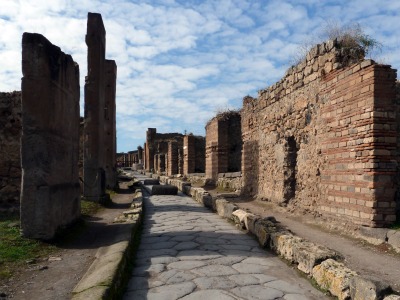 Since the Roman ruins around Naples are in the news again recently due to the collapse of one of Pompeii buildings, and since I just visited both Pompeii and Herculaneum on my recent trip to Italy, I thought I’d go over what it takes to do a DIY tour of both sites in a day. There are many tours you can sign up for that include one or both of the archeaological sites (some of them even include a short hike around Mt. Vesuvius), but if you’d prefer to organize your own trip these are the things you should know.
Since the Roman ruins around Naples are in the news again recently due to the collapse of one of Pompeii buildings, and since I just visited both Pompeii and Herculaneum on my recent trip to Italy, I thought I’d go over what it takes to do a DIY tour of both sites in a day. There are many tours you can sign up for that include one or both of the archeaological sites (some of them even include a short hike around Mt. Vesuvius), but if you’d prefer to organize your own trip these are the things you should know.
First off, I highly recommend that you read the overviews of both sites written by my friend and former Naples resident Karen Landes – they’re full of visitor’s tips as well as information on how to get to each site and what not to miss.
- Visiting Pompeii
- Visiting Herculaneum
Second, the assumption I’m making here is that you’re using Naples as a home-base from which to explore Pompeii and Herculaneum. There are other places you can use (Salerno is another popular one), but Naples makes the most sense for a number of reasons. It’s close to both sites and has excellent public transport that will carry you to all the places you need to go, and it’s also where the country’s top archaeological museum – the one with all the mosaics, frescoes and statues they removed from Pompeii and Herculaneum – happens to be. A visit to the museum after a day spent walking around Pompeii and Herculaneum will give you even greater appreciation for the artistic skills of the Romans – not to mention the preservative powers of volcanic ash and mud.
How to Do a DIY Tour of Pompeii and Herculaneum
Make a Schedule
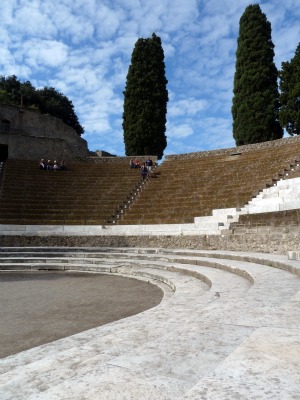 You don’t have to plan this down to the nanosecond, but before departing on your day out have a general idea of when the trains run so you can maximize your time at the sites and not waiting on train platforms. You can also do the sites in any order, but since Pompeii is so much larger than Herculaneum I think it makes sense to visit Pompeii first, for the following reasons:
You don’t have to plan this down to the nanosecond, but before departing on your day out have a general idea of when the trains run so you can maximize your time at the sites and not waiting on train platforms. You can also do the sites in any order, but since Pompeii is so much larger than Herculaneum I think it makes sense to visit Pompeii first, for the following reasons:
- In warmer weather, you don’t want to be walking around Pompeii – exposed to the sun – in the afternoon, the hottest part of the day. Cover it in the morning before the heat is unbearable.
- A lunch break midday gives your feet a chance to rest after all the walking you’ll do at Pompeii, and they won’t have to suffer for a similarly long time at the much smaller Herculaneum.
The one downside to visiting Pompeii first thing in the morning is that’s when most of the tour groups show up, too, so you may be fighting the crowds a little bit at the entrance when you first arrive. But Pompeii is so vast that it’s unlikely you’ll be troubled by crowds for long – especially if you’re not following the same tour route as everyone else.
The schedule I followed, and that I’m discussing below, is: Pompeii in the morning, followed by a lunch break near Pompeii, and an afternoon visit to Herculaneum.
How to Get to Pompeii from Naples
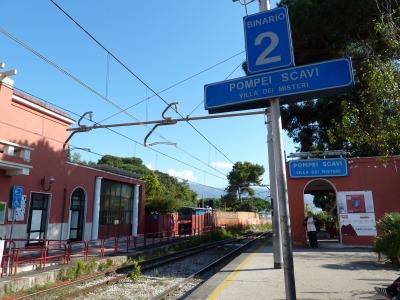
- Take the Circumvesuviana train from Naples Garibaldi station (it’s downstairs from the main tracks) to the “Pompei Scavi/Villa dei Misteri” stop (direction Sorrento).
- Exit the station, turn right, and walk roughly five minutes to the main entrance at Porta Marina.
Pompeii Tips
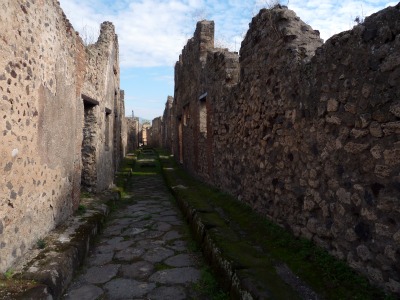
- Allow roughly 3-4 hours on site at Pompeii (not including train time) to cover the basics, more if you want to explore beyond the major points.
- Bring snacks (especially if you’re traveling with kids – or anyone who’s likely to be cranky when hungry) because there’s only one cafe within the excavations site and it’s predictably overpriced and mediocre.
- Parents, be prepared to either have your kids walking the whole time or carry them in a backpack of some kind – the cobbles are hard enough to navigate on foot, let alone with a stroller (I saw frustrated families struggling with strollers, this isn’t just conjecture.)
- Bring a water bottle – you can refill it at the many water fountains (adapted from the Roman ones with new, non-lead pipes) throughout the site.
- Bring a guide of some kind – a podcast audio guide or walking tour – with you. The map and booklet you get for free with your ticket are good (the map is invaluable), but there are benefits to having a more in-depth guide that the independent traveler will miss if they’re doing a DIY tour. There’s an audio guide available for rent at the information booth near where you buy your tickets, and if you’re pooling your resources with several other travelers, you can also hire a tour guide at the entrance if you prefer.
How to Get a Good Lunch After Visiting Pompeii
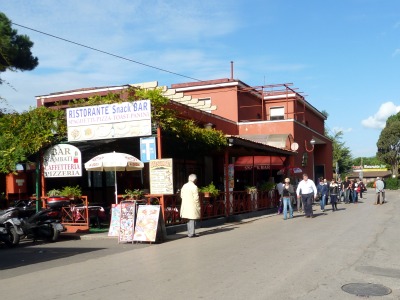 Walking to and from the train station to the Pompeii entrance, you have to run the gauntlet of food and tchotchke hucksters – and it doesn’t require a degree in hospitality to know that the stuff they’re selling isn’t going to be cheap. Not only that, the food will be decidedly meh. You can certainly bring a picnic lunch and enjoy it sitting on an ancient Roman curb somewhere within Pompeii, but if you don’t want to tote your whole lunch with you and you’d still like to avoid paying too much for a crummy meal just because it’s close by, the solution is simple.
Walking to and from the train station to the Pompeii entrance, you have to run the gauntlet of food and tchotchke hucksters – and it doesn’t require a degree in hospitality to know that the stuff they’re selling isn’t going to be cheap. Not only that, the food will be decidedly meh. You can certainly bring a picnic lunch and enjoy it sitting on an ancient Roman curb somewhere within Pompeii, but if you don’t want to tote your whole lunch with you and you’d still like to avoid paying too much for a crummy meal just because it’s close by, the solution is simple.
On my recent visit, I wasn’t hungry enough to be desperate when I left Pompeii, so I just started walking. Within a few minutes I was outside the tourist circle, and within 10 minutes I was inside a sort of pizzeria/deli full of locals where I ordered a sandwich the size of my head plus three beverages for a grand total of €6. It’s only in consulting Google Maps now that I’m able to figure out where I was – turns out I had walked in the opposite direction from modern-day central Pompei, and was partway to nearby Torre Annunziata – but the point is that it only took a few minutes of walking along a main road away from the Pompeii entrance to find a place to get a really good meal for a fraction of what it would have cost to eat right outside the excavations.
Should you decide to go wandering a bit in search of more lunch options, I do recommend having a better map of the area than just the map of the Pompeii excavations themselves so you know how to get back to the train station for the trip to Herculaneum. I ended up having to stop into a tourist information office (thankfully it was open) to get walking directions back where I needed to go.
How to Get to Herculaneum from Pompeii
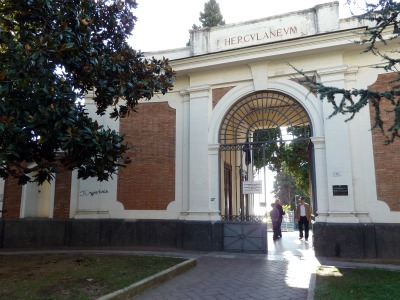
- Take the Circumvesuviana train from the “Pompei Scavi/Villa dei Misteri” stop to “Ercolano Scavi” stop (direction Napoli).
- Exit the station, go down the stairs, and walk down the hill on the main street for roughly 10 minutes to the Herculaneum entrance.
Herculaneum Tips
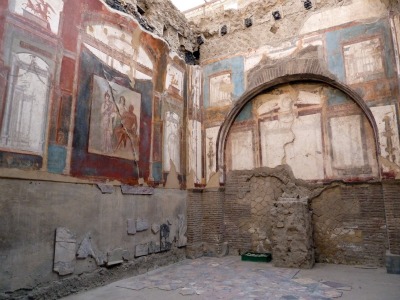
- Herculaneum is the Latin name of the site – the Italian name is Ercolano, and like Pompei (with one I, the new town next to the excavations) there’s a modern city of Ercolano around (and above) the Ercolano excavations.
- Allow roughly 2 hours on site at Herculaneum; it’s quite small, especially in comparison to Pompeii, and even if you stroll you won’t need much more time than that.
- When you walk down the steps from the train station, you’re greeted by a small parking lot full of taxis and their eager drivers. Walk through this phalanx of cars, ignoring the drivers offers of rides to Ercolano and Vesuvius, because the walk from the station to the Ercolano entrance is short and all downhill. (Yes, the walk back is uphill, but it’s not bad. Really.)
- The same note from the Pompeii tips above about parents toting kids in backpacks or expecting them to walk (rather than using strollers) goes for Herculaneum, too – even more so because Herculaneum is more hilly than Pompeii in addition to being cobblestoned.
- You’ll be able to refill that water bottle I suggested you bring to Pompeii at the many similar water fountains of Herculaneum, too, so hang onto the bottle.
- Bring a guide of some kind – a podcast audio guide or walking tour – with you. There’s an audio guide you can rent at the information desk near where you buy your tickets, but because Herculaneum isn’t nearly as busy as Pompeii there aren’t tour-guides-for-hire milling about the entrance waiting for you to use their services. You get a map and booklet for free with your ticket, just like you do at Pompeii, but the information in the booklet isn’t as interesting as what you’d get from a real walking tour.
How to Get from Herculaneum to Naples
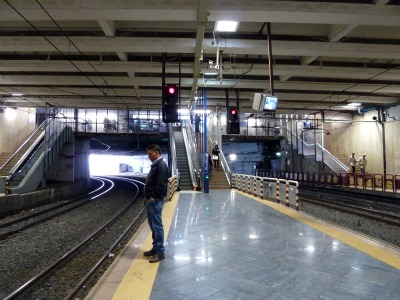
- Take the Circumvesuviana train from the “Ercolano Scavi” stop to Naples Garibaldi station (direction Napoli). Note that there are two stops marked “Napoli” – you want the first one if you’re aiming for Garibaldi, the city’s main train station.
- Exit the train and climb the stairs two levels up to get back to the main Garibaldi station.
all photographs by Jessica Spiegel and may not be used without permission
 Since the Roman ruins around Naples are in the news again recently due to the collapse of one of Pompeii buildings, and since I just visited both Pompeii and Herculaneum on my recent trip to Italy, I thought I’d go over what it takes to do a DIY tour of both sites in a day. There are many tours you can sign up for that include one or both of the archeaological sites (some of them even include a short hike around Mt. Vesuvius), but if you’d prefer to organize your own trip these are the things you should know.
Since the Roman ruins around Naples are in the news again recently due to the collapse of one of Pompeii buildings, and since I just visited both Pompeii and Herculaneum on my recent trip to Italy, I thought I’d go over what it takes to do a DIY tour of both sites in a day. There are many tours you can sign up for that include one or both of the archeaological sites (some of them even include a short hike around Mt. Vesuvius), but if you’d prefer to organize your own trip these are the things you should know. You don’t have to plan this down to the nanosecond, but before departing on your day out have a general idea of when the trains run so you can maximize your time at the sites and not waiting on train platforms. You can also do the sites in any order, but since Pompeii is so much larger than Herculaneum I think it makes sense to visit Pompeii first, for the following reasons:
You don’t have to plan this down to the nanosecond, but before departing on your day out have a general idea of when the trains run so you can maximize your time at the sites and not waiting on train platforms. You can also do the sites in any order, but since Pompeii is so much larger than Herculaneum I think it makes sense to visit Pompeii first, for the following reasons:

 Walking to and from the train station to the Pompeii entrance, you have to run the gauntlet of food and tchotchke hucksters – and it doesn’t require a degree in hospitality to know that the stuff they’re selling isn’t going to be cheap. Not only that, the food will be decidedly meh. You can certainly bring a picnic lunch and enjoy it sitting on an ancient Roman curb somewhere within Pompeii, but if you don’t want to tote your whole lunch with you and you’d still like to avoid paying too much for a crummy meal just because it’s close by, the solution is simple.
Walking to and from the train station to the Pompeii entrance, you have to run the gauntlet of food and tchotchke hucksters – and it doesn’t require a degree in hospitality to know that the stuff they’re selling isn’t going to be cheap. Not only that, the food will be decidedly meh. You can certainly bring a picnic lunch and enjoy it sitting on an ancient Roman curb somewhere within Pompeii, but if you don’t want to tote your whole lunch with you and you’d still like to avoid paying too much for a crummy meal just because it’s close by, the solution is simple.

